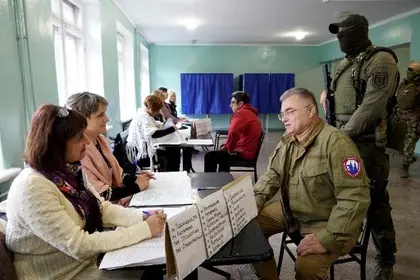The EU said Tuesday it will slap sanctions on organisers of “illegal” votes in four occupied regions of Ukraine that Russia is conducting as “referendums” with the aim of annexation.
“There would be consequences for all people who participate in the illegal, illegitimate referendums,” Peter Stano, a spokesman for EU foreign policy chief Josep Borrell, told journalists as the voting took place for a fifth and final day.
- Look at the most up-to-date Ukraine news that came out today.
- Russian Losses in Ukraine
JOIN US ON TELEGRAM
Follow our coverage of the war on the @Kyivpost_official.
A high-ranking official in Borrell’s foreign policy service, Luc Devigne, separately told EU lawmakers that “we will put in individuals that are obviously linked to the recent steps with these referendums” in the sanctions package.
The EU’s 27 member states are deliberating on fresh sanctions on Russia for holding the vote, widely dismissed by the West as a “sham”.
Any measures have to be unanimously agreed.
While Hungary’s Prime Minister Viktor Orban, who maintains cosy ties with the Kremlin, has voiced scepticism over more sanctions, there is general agreement in the EU that a stern response is required.
Devigne did not detail what the next sanctions package would contain. But he explained it would include new bans on Russian exports and imports and extend sanctions on some Russian business activities, as well as adding “new listings of companies and individuals”.
“We have been clear that those who are involved with these so-called referenda will be held accountable and this will (also) be the subject of… the additional restrictive measures,” he said.

Trump Makes 90 Day Foreign Aid Freeze – Ukraine Military Support Supposedly Untouched
He added that there was still “a lot of leeway” to hit Russia’s economy, which relies heavily on trade links with the EU.
Stano and Devigne each stressed that the EU would not recognise the results of Russia’s “referendums”, which are expected to lead to President Vladimir Putin declaring the annexation of the four Ukrainian regions as early as Friday.
The voting follows the same template as that which Russia carried out in 2014 in Ukraine’s occupied Crimea region, which resulted in Moscow declaring Crimea part of Russia — something globally unrecognised except for a handful of Russian allies.
A few invited EU citizens — reportedly including a German CEO of an energy company and a far-right French politician — have been among foreigners acting as Russian-endorsed poll “observers” in the voting in the Ukraine regions.
Stano said they risked being punished if found to have broken EU sanctions.
“Of course, it will depend on the degree to which people are involved,” he said, adding it was up to EU member states “to see whether or not on a case-by-case basis if there is a need for measures to be taken against such people”.
You can also highlight the text and press Ctrl + Enter










